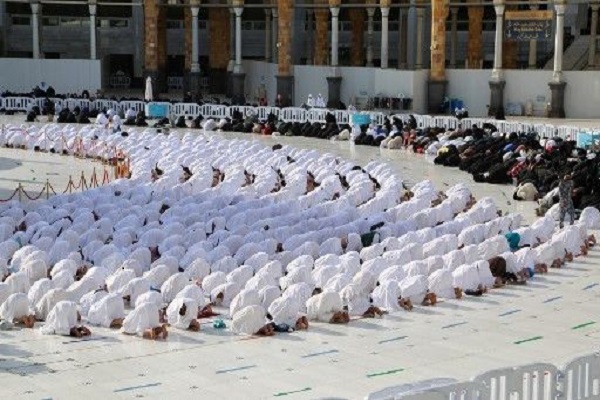Indonesia’s Umrah Plans Overshadowed by High COVID-19 Death Toll in Saudi Arabia

It comes as Saudi authorities grapple with the dilemma of protecting undocumented workers and allowing its people to resume religious pilgrimages there.
Just two months shy of entering its third year in March, the pandemic has left a trail of death, crippled health systems and a battered global economy.
The work of protecting travelers and migrant populations has become more demanding, with host governments unable to shift their attention beyond their own people, especially when it involves illegal or undocumented laborers.
Out of the nearly 8,000 Indonesians infected by COVID-19 abroad, more than 100 have died in Saudi Arabia alone.
According to recent ministry data, 7,974 Indonesian nationals have been infected with the coronavirus overseas since the start of the pandemic in 2020. From this figure, 273 have died, with the biggest share occurring in the Saudi kingdom – though there have been higher caseloads among Indonesian citizens in other countries.
In Saudi Arabia, 101 out of the 270 Indonesians infected have died, while in nearby Qatar it was three out of 741, two out of 831 in Singapore and no deaths out of the 366 cases reported in Hong Kong.
The ministry’s director for citizen protection, Judha Nugraha, cited several factors, including the rise in cases in Saudi Arabia and the fact that the kingdom plays host to the second-largest population of Indonesian migrant workers after Malaysia.
“From our records, our citizens who are most affected by COVID-19 infections in Saudi Arabia are migrant workers who worked as drivers,” Judha said in a briefing earlier this month. Part of the problem is the limited access that migrant workers have to supplies that allow them to sufficiently protect themselves.
Poor access, coupled with the high volume of close contact with other people that comes with the profession, makes for a deadly combination.
As a remedy, Judha said, Indonesian diplomatic mission offices in Riyadh and Jeddah had urged employers to provide migrant workers with sufficient personal protection equipment such as face masks.
But that is not the only problem authorities face.
Executive director of the Migrant CARE advocacy group, Wahyu Susilo, said the high number of deaths might be “the tip of the iceberg” and the government must not treat such infection cases “like business as usual”.
“I think the high number of deaths occurred because [migrant workers] are unable to gain access to health facilities, especially if they are undocumented. This is why the government needs to do more to intervene,” Wahyu told The Jakarta Post.
Judha reassured, however, that all Indonesian citizens who tested positive for COVID-19 in Saudi Arabia would be provided the necessary treatment.
The bigger challenge, he said, was access to COVID-19 vaccines, especially among undocumented workers who might be hesitant about going to vaccination centers for fear of deportation, even though Saudi authorities have committed to inoculating the entire population.
“Indonesia’s representative offices have provided vaccines for them. We’ve successfully vaccinated 88,000 Indonesians abroad, including in Saudi Arabia,” Judha said.
The Middle Eastern kingdom has witnessed a significant jump in transmission because of the Omicron variant, with authorities reporting 5,477 new cases on Sunday, just days after booking their highest-ever number of daily new cases.
Over recent weeks, Riyadh has brought back mask mandates in public, as well as social distancing measures at Mecca’s Grand Mosque – Islam’s holiest site – and other public spaces, according to various news agencies. The case spikes have also started to affect international arrivals to Indonesia, which remains the biggest contributor to new COVID-19 cases in the country.
Indonesia’s Consul General in Jeddah, Eko Hartono, told the Post on Tuesday that 28 Indonesian pilgrimage tour operators had tested positive for COVID-19 after concluding preparations for the Umrah (minor Hajj pilgrimage) in Saudi Arabia.
Prior to that, 13 pilgrimage administrators were found to be positive upon their return to Jakarta, local media reported. All of those accounted for are being quarantined at the Wisma Atlet emergency hospital in Kemayoran, Central Jakarta.
According to data from the Jeddah mission, however, as many as 2,023 pilgrims are still taking part in the Muslim worship rites in the kingdom as of Monday, although none have tested positive for the coronavirus.
The government has been sending mixed signals with regard to its travel advisory to Saudi Arabia, especially for citizens keen to go on Umrah amid concerns over high COVID-19 cases in the country.
Religious Affairs Minister Yaqut Cholil Qoumas said the government could not legally prevent its citizens from travelling anywhere they wanted as long as they obtained the required visa.
He stressed that Indonesian citizens who want to go to Saudi Arabia for Umrah should travel using the state-regulated One Gate scheme, despite the more than a dozen tour organizers that have tested positive during preparations.
“It would be even riskier to allow travel without the One Gate policy,” Yaqut said during a hearing with the House of Representatives on Monday.
Source: The Star



